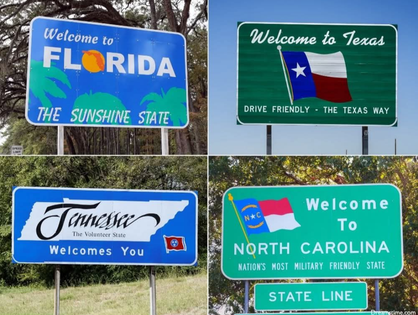
A new analysis from the National Taxpayers Union Foundation (NTUF) reveals a striking trend: millions of Americans are relocating from high-tax, heavily regulated states—primarily governed by Democrats—to Republican-led states offering lower taxes, fewer regulations, and what many perceive as a higher quality of life.
🚚 Migration Patterns and Economic Impact
According to the NTUF report, states like California, New York, and Illinois have experienced significant population losses between 2011 and 2021. California alone lost 1.6 million residents, resulting in an estimated $4.5 billion drop in tax revenue. New York followed closely, losing 1.7 million residents and $3.8 billion in revenue.
In contrast, Republican-led states such as Florida and Texas have seen dramatic gains. Florida welcomed over 1.5 million new residents, translating to $4.1 billion in additional revenue, while Texas gained 1.2 million residents and $914 million in revenue.
💰 Tax Burden as a Driving Force
The NTUF attributes these shifts largely to tax burdens. States with the highest effective state and local tax rates saw a net outflow of over 232,000 taxpayers in 2019 alone, taking with them $31.2 billion in adjusted gross income. Meanwhile, states with lower tax rates—including those with no state income tax—attracted 283,000 taxpayers and $37.8 billion in wealth.
🏡 Quality of Life and Political Ramifications
Beyond financial considerations, many Americans cite quality of life, government overreach, and regulatory burdens as reasons for their move. The migration trend is expected to have long-term political consequences, including shifts in congressional representation and redistricting outcomes.
---
⚠️ Disclaimer
This article is based on data from the National Taxpayers Union Foundation and other sources. While the findings highlight correlations between tax policy and migration patterns, individual decisions to relocate are influenced by a variety of factors including employment, housing, climate, and personal circumstances. The framing of states by political leadership is used here to reflect governance trends but does not imply uniformity in policy or outcomes. Readers are encouraged to consult multiple sources and perspectives when interpreting migration data.


Add comment
Comments